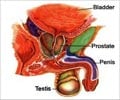Primary androgen-deprivation therapy (PADT) for men with clinically localized prostate cancer has been to found to be of no effect while it may be of small clinical benefit to men with higher-risk disease. The risks of using PADT outweighs benefits, the researchers observed.
Primary ADT is the second most common treatment, after radiotherapy, for men aged 65 years and longer with clinically localized prostate cancer. ADT is based on the reduction of androgen hormones, the male sex hormones, which stimulate prostate cancer cells to grow. Bringing down the levels of androgen or preventing them from entering the prostate cancer cells should theoretically make the cancer shrink or slow down its growth.Based on the new study, authors caution against "the overuse of androgen-deprivation therapy," and state that PADT impairs quality of life.
"Primary [ADT] may be preferable to some men with early-stage prostate cancer who would prefer to do something rather than watch and wait for further signs of progression to occur later and then need treatments," says lead investigator Arnold Potosky, PhD, a professor of oncology and director of health services research at Georgetown Lombardi Comprehensive Cancer Center in Washington, DC. "However, using [primary ADT] by itself immediately after diagnosis in the hopes of limiting cancer's progression does not extend survival, according to this study."
The group of researchers analyzed data from more than 15000 men with a new diagnosis of clinically localized prostate cancer who were not treated with curative intent therapy. The subjects included in the study were diagnosed from 1995 to 2008 and were followed until 2010.
Men who received PADT were found to have no survival benefits over those who did not. "There appears to be no mortality benefit from PADT for men with clinically localized prostate cancer not receiving curative-intent therapy. Even in the subgroup of men with high-risk disease, the benefit is relatively small," notes Dr. Potosky. "Therefore, any benefit should be weighed against evidence from other studies showing an increased risk of serious side effects from PADT, including cardiovascular diabetes and bone fractures," he added.
Dr. Potosky and colleagues published their findings in the Journal of Clinical Oncology. They agree that their study has some limitations that included an incomplete information of the stage of cancer on many men and short follow-up.
Reference:
Source-Medindia





![Prostate Specific Antigen [PSA] Prostate Specific Antigen [PSA]](https://www.medindia.net/images/common/patientinfo/120_100/prostate-specific-antigen.jpg)







